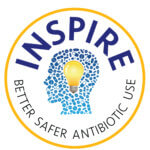Updated study snapshots and ethics and regulatory documentation are now available for the IMPACt-LBP and INSPIRE trials, both NIH Pragmatic Trials Collaboratory Trials.
 IMPACt-LBP transitioned from the planning phase to the implementation phase in August. As part of the transition, the study team reviewed and updated the minutes of their initial consultation with the Ethics and Regulatory Core. The study is a cluster randomized trial evaluating the effect of first-contact patient referral to physical therapists and doctors of chiropractic for the treatment of low back pain. IMPACt-LBP is supported within the NIH Collaboratory under an award from the National Center for Complementary and Integrative Health.
IMPACt-LBP transitioned from the planning phase to the implementation phase in August. As part of the transition, the study team reviewed and updated the minutes of their initial consultation with the Ethics and Regulatory Core. The study is a cluster randomized trial evaluating the effect of first-contact patient referral to physical therapists and doctors of chiropractic for the treatment of low back pain. IMPACt-LBP is supported within the NIH Collaboratory under an award from the National Center for Complementary and Integrative Health.
- Read the updated ethics and regulatory documentation, including information about the study team’s approach to informed consent and collection of patient-reported outcome data.
- Also available is an updated study snapshot for IMPACt-LBP.
 INSPIRE joined the NIH Collaboratory at the beginning of its implementation phase. The study team held its initial consultation with the Ethics Regulatory Core to review their approach their approach to consent, data privacy, and the applicability of recent FDA guidance regarding clinical decision support software functions. INSPIRE consists of 2 cluster randomized trials that are using personalized clinical decision support to improve judicious antibiotic prescribing for non–critically ill patients hospitalized with abdominal infections or skin and soft tissue infections. The project is supported within the NIH Collaboratory under an award from the National Institute of Allergy and Infectious Diseases.
INSPIRE joined the NIH Collaboratory at the beginning of its implementation phase. The study team held its initial consultation with the Ethics Regulatory Core to review their approach their approach to consent, data privacy, and the applicability of recent FDA guidance regarding clinical decision support software functions. INSPIRE consists of 2 cluster randomized trials that are using personalized clinical decision support to improve judicious antibiotic prescribing for non–critically ill patients hospitalized with abdominal infections or skin and soft tissue infections. The project is supported within the NIH Collaboratory under an award from the National Institute of Allergy and Infectious Diseases.
- Read the INSPIRE ethics and regulatory documentation.
- See also the study snapshot for INSPIRE.




